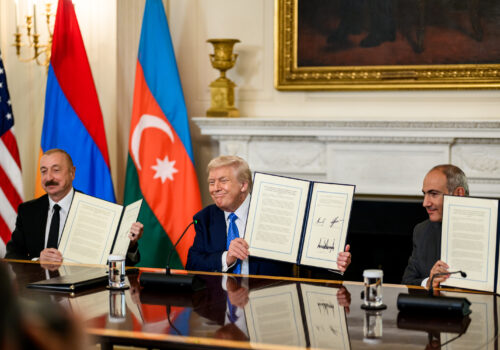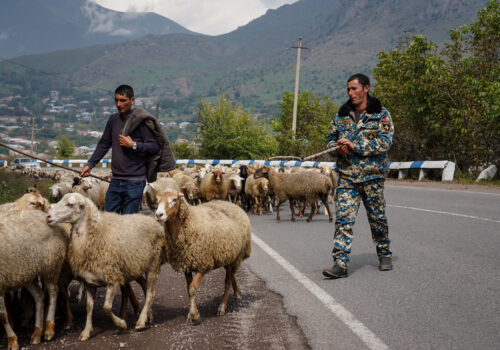Russia’s imperial approach toward Armenia and Azerbaijan has backfired
When the leaders of long-warring Armenia and Azerbaijan met at the White House on August 8, they initialed a peace agreement—not a final treaty, but a gateway to one. They also signed a joint declaration establishing the “Trump Route for International Peace and Prosperity” (TRIPP), a twenty-five-mile corridor designed to link Azerbaijan with its exclave Nakhchivan through Armenia. Together, these moves mark major wins for Armenia, Azerbaijan, and the United States. At the same time, Russia emerges as the biggest loser.
The Trump administration deserves credit for arbitrating the sensitive talks over a brutal conflict that displaced more than a million people and left more than 35,000 dead. But the diplomatic breakthrough was also made possible by a series of Russian miscalculations and by Moscow’s disregard for the sovereignty of its neighbors.
If the United States wants to build on this achievement, then it should promote Armenia’s regional integration, move quickly to transform the TRIPP from an idea into a reality, and deepen its ties with other countries in the region. Doing so would weaken Russia’s grip on the South Caucasus, which Moscow has long treated as part of its own domain, much like it has with Ukraine. Despite the independence of Georgia, Armenia, and Azerbaijan after the fall of the Soviet Union, Russia continues to view their borders as fluid markers of power, subject to revision at will.
Russia’s long shadow
To view borders in this way is nothing short of imperial. Of course, this is nothing new for the Kremlin. In many ways, Russian imperial thought has guided the country’s rulers for hundreds of years. As Nicholas I famously said in the middle of the nineteenth century: “Where the Russian flag has been hoisted, it shall never be lowered.” More recently, Russian President Vladimir Putin echoed this sentiment, saying that “the borders of Russia do not end.” And when Russian Foreign Minister Sergei Lavrov arrived at the Alaska summit in a sweater with “USSR” embroidered on it, he sent the same message: What was once ours will always be.
But it is exactly this mentality that has driven away neighbors who might otherwise have formed partnerships. Throughout the thirty-year conflict over Karabakh, Moscow played both sides to keep Yerevan and Baku dependent, seeking to dominate them. In Armenia, limited regional integration left the economy tethered to Russia for critical energy and most wheat imports. In Azerbaijan, any move that might upset Russia threatened to invite greater support for Karabakh’s independence.
For decades, Armenia outsourced its security to Russia through the Collective Security Treaty Organization (CSTO). But when hostilities in September 2022 saw Azerbaijani forces push into Armenian territory, Yerevan’s request for military assistance was denied. And in 2023, Russian peacekeepers stood aside as Baku retook Karabakh, forcing its ethnic Armenian population to flee. By contrast, Azerbaijan had exited the Russian-led collective security system back in 1999, yet Moscow continued courting Baku with major arms sales and deepening ties in energy and other sectors, all while acting as Yerevan’s security guarantor and top weapons exporter. In the wake of Russia’s betrayal, Armenia’s pivot is inevitable—what remains uncertain is how fast and how far it can break free from Moscow’s shadow.
Intimidation as statecraft
While Russian pundits have downplayed the significance of the peace deal, the Caucasus region remains important to Moscow—not just sentimentally, but strategically. The Caspian basin is rich in oil and gas, and it is home to the Middle Corridor, a transit route from Asia to Europe that bypasses both Russia and Iran. This corridor is likely to become increasingly important as the competition for rare-earth elements grows, since Central Asia holds vast reserves of critical minerals. Moscow understands this, which is why it has supported two separatist republics in Georgia since the early 1990s and has used military force, including invading the country in 2008 when it sought to move closer to the West.
Russia uses the same tactics to keep Azerbaijan and Armenia under its influence. Moscow has repeatedly responded to Yerevan’s efforts to align with the West with retaliation, pairing diplomatic snubs with targeted economic pressure intended to remind Armenians who is in charge. When Yerevan froze participation in the CSTO, the Kremlin recalled its ambassador and publicly condemned Armenia’s ratification of the International Criminal Court as “incorrect.” Regulators then went after livelihoods, squeezing important Armenian exports in ways that resembled a shakedown: a sweeping dairy ban in 2023, wider agricultural import restrictions in 2024, and a crippling blow to Armenia’s flower trade in 2025. On the security front, Russia withheld millions in prepaid weapons, breaking promises while daring Yerevan to complain. By July 2024, Yerevan pushed back, expelling Russian FSB border guards from its airport.
Likewise, Russia has sought to intimidate Azerbaijan. After Russian air defenses shot down an Azerbaijani civilian plane in December 2024, Baku retaliated by shutting down the Russian state-sponsored media outlet Sputnik. Moscow answered by targeting the Azerbaijani diaspora, a tactic Russian politicians have threatened in the past. Using a twenty-four-year-old murder case as a pretext, security services in Yekaterinburg, Russia, rounded up prominent Azerbaijanis. Many were tortured—and two brothers, Huseyn and Ziyaddin Saffarov, were killed. Russia returned their bodies to Azerbaijan for burial, making no effort to obfuscate the cause of death. Besides clear evidence of torture, the Russian independent media outlet Proekt reported that the brothers’ genitals had been severed, possibly postmortem.
Central Asia has faced similar treatment. A common Russian tactic is causing “malfunctions” on pipelines carrying Kazakhstani oil to the West. Curiously, these disruptions often coincide with Astana taking diplomatic steps that Moscow dislikes. For instance, a disruption shortly followed President Kassym-Jomart Tokayev’s August 2022 visit to Azerbaijan to explore exporting Kazakhstani oil through the Middle Corridor.
This mob-style messaging is a constant in Russian politics, despite Moscow’s worries about strained regional ties due to its war against Ukraine and Western sanctions. Even when holding a weak hand and needing to strengthen alliances, Russia defaults to intimidation over persuasion. Through bullying and colonial divide-and-conquer tactics, Moscow has pushed away neighbors in the Caucasus, who realize that Russia seeks their subjugation.
A new playbook for peace in the region
The Azerbaijan-Armenia peace breakthrough in Washington may offer a different lever against Russia by expanding US partnership to the Caucasus region. But securing lasting peace requires more than building TRIPP—it also calls for opening new road and rail links through Armenia to Azerbaijan and Turkey, effectively stitching the region back into global commerce. Extending that connectivity to Central Asia would allow states to scale the Middle Corridor and bypass Russia. This could help secure key supply chains and tap reserves of rare-earth elements and strategic minerals essential for modern technologies such as smartphones, electric cars, and semiconductors. This strategy would complement aid to Ukraine and sanctions on Moscow—without firing a shot.
Sheila Paylan is a human rights lawyer and senior legal consultant with the United Nations.
Joseph Epstein is the director of the Turan Research Center at the Yorktown Institute.
Further reading
Wed, Aug 13, 2025
Trump’s Armenia-Azerbaijan agreement advanced peace, but Washington can’t let up now
New Atlanticist By
The US-brokered agreement between Armenia and Azerbaijan was an important step. But to achieve a lasting peace, the Trump administration must remain actively engaged as negotiations continue.
Mon, Jun 9, 2025
Armenia’s ‘crossroads’ offers the US and Israel a rare opportunity
MENASource By
Clinching peace between Armenia and Azerbaijan offers the US and Israel a rare chance to tilt the balance of power in the South Caucuses.
Mon, May 12, 2025
Azerbaijan and Kazakhstan are the Abraham Accords’ new frontier
MENASource By
Joining the Accords could benefit Baku and Astana, while also helping Israel and the US strengthen engagement with the Turkic world.
Image: August 8, 2025, Washington, District of Columbia, USA: President Donald Trump signs a trilateral joint declaration with President Ilham Aliyev of Azerbaijan and Prime Minister Nikol Pashinyan of Armenia, Friday, August 8, 2025, in the State Dining Room. (Credit Image: ? Daniel Torok/White House/ZUMA Press Wire) Via REUTERS


